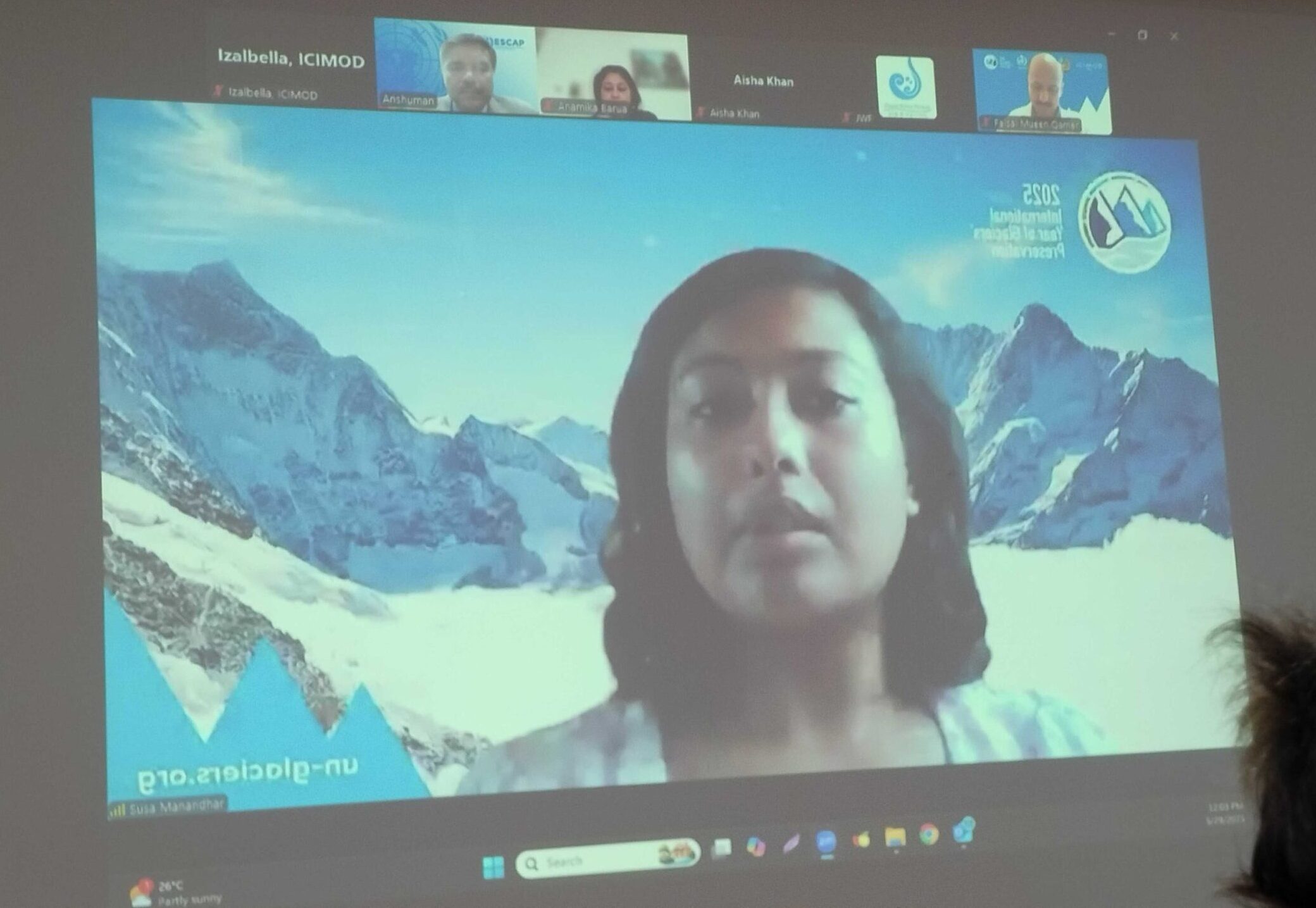SEN in collaboration with the Department of Hydrology and Meteorology (DHM), Government of Nepal, organized the regional level workshop “Rainwater harvesting to mitigate the impacts of climate change in the Karnali River Basin, Nepal” in Birendranagar, Surkhet on 13th January 2019. The objectives of the regional workshop were to officially launch the android based mobile application “AakashePani” developed for the collection of rainwater harvesting at a household level in the whole basin of Karnali River and to share the rainwater harvesting suitability mapping for the Karnali region. It was a part of the Project “Rainwater harvesting to mitigate drought in Western Nepal” supported by Asia Pacific Network for Global Change Research (APN), Japan.
During the workshop, Hon. Minister Nanda Singh Buda, Minister, Industry, Tourism, Forestry, and Environment of Karnali Province officially launched the mobile application by installing it. Dignitaries from different line agencies of government such as Ministry of Energy, Water Resources & Irrigation, Ministry of Industry, Tourism, Forestry and Environment, Department of Hydrology and Meteorology, Nepal Academy of Science and Technology (NAST), Regional Climate Office, Surkhet, District Development Committee (DCC), Surkhet, District Administration Office, Surkhet, District Forest Office, Surkhet, Water and Energy Commission Secretariat (WECS) were present to promote the use of the mobile application for rainwater harvesting in Karnali River Basin. More than 60 participants were present representing different organizations working in Karnali Basin like United Nations Development Program (UNDP), Nepal Climate Change Support Program (NCCSP), SNV Nepal, World Food Program (WFP), UNICEF, Save the Children, etc.
The Chief Guest of the program, Hon. Minister Nanda Singh Buda stated that the province is remote in many parts and development activities are further exacerbated by fragile geology. Awareness at a household, ward, and community level will help in the prosperity of the Karnali Basin. “Innovative ideas like rainwater harvesting app will play a crucial in the region and anticipate the implementation of such knowledge and support in the future for the development of the region”, he added. Similarly, Dr. Madan Lall Shrestha, academician of Nepal Academy of Science and Technology, in his key-note speech, stressed that a rise in temperature and decreasing rainfall is causing retreat in glacier areas at an alarming rate which is the ultimate source of rivers in Nepal. “So, we need to be concerned about harvesting rainfall in the coming years”, he added. In addition to this, Dr. Rishi Ram Sharma, Joint Secretary, Water, and Energy Commission Secretariat, Ministry of Energy, Water Resources and Irrigation mentioned that knowledge on water resource management is often lacking in our country. According to him, rainwater harvesting can be a useful resource for curbing water resource constraints in a Province like Karnali, for its overall development.
Mr. Jeeban Panthi, Research Associate at The Small Earth Nepal (SEN) and researcher at University of Rhode Island (URI), USA, emphasized that water poverty and excess runoff induced by changing climate led to the concept development of rainwater harvesting as a part of water-based adaptation to climate change in Karnali Basin. Mr. Nammy Hang Kirat, Research Associate from SEN shared technical details of the rainwater harvesting mobile application. Similarly, Mr. Piyush Dahal, Research Coordinator from SEN shared the rainwater harvesting suitability mapping for the Karnali region.
Furthermore, drying water resources, drying springs, reducing water table, the establishment of climate office state-wise were the major concerns of the participants attending the workshop. Before the regional level workshop at Surkhet, a district level workshop was organized in Jumla in coordination with District Coordination Committee (DCC), Jumla on January 10th, 2019. The program comprised a technical session to disseminate information regarding the changing climate in Karnali River Basin, the importance of rainwater harvesting, and the usefulness of mobile application “AakashePani”.
During the workshop, Mr. Panthi talked about the water poverty of the overall Karnali basin and emphasized rainwater harvesting as a part of water-based adaptation to climate change. Mr. Dahal talked about the changing climate in Karnali Basin. He shared that temperature is rising at an alarming rate with a decreased precipitation. Though the overall discharge at the river remains the same throughout the year much of the river discharge may be attributed by the melting of snow and glaciers. Similarly, Mr. Kirat shared rainwater harvesting suitability mapping and rainwater harvesting mobile application.
Multiple-use of water in offseason, drying rivers, quality control measures of rainwater storage, subsidies in implementation of sprinkler irrigation in agriculture, and efficiency of rainwater harvesting from a hut built during the grazing season in uphill areas by the herders were the concerns of people attending the workshop.
In addition to this, Vice-chair of Tila Rural Municipality Bishnu Maya Buda stated that effective water utilization of Tila River through collaboration with government and cooperation of people in uphill areas that do not have access to water resources for drinking is her interest. Less precipitation (i.e. snowfall) is affecting the livelihood of Jumla and budget is another constraining factor said, Vice-chair Buda.




